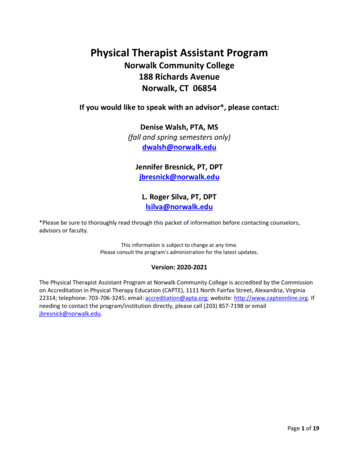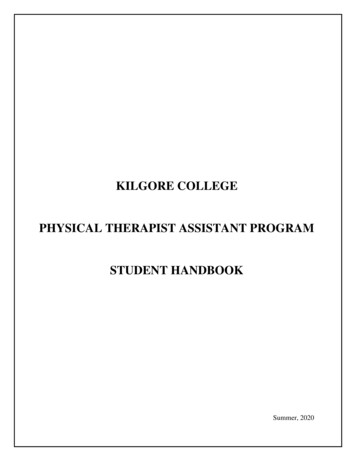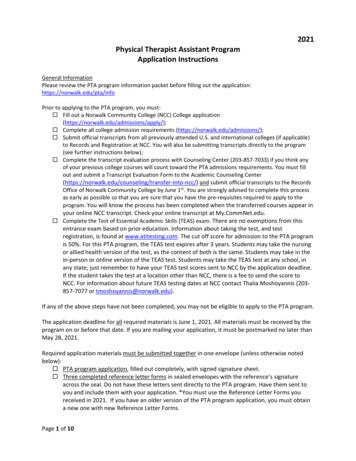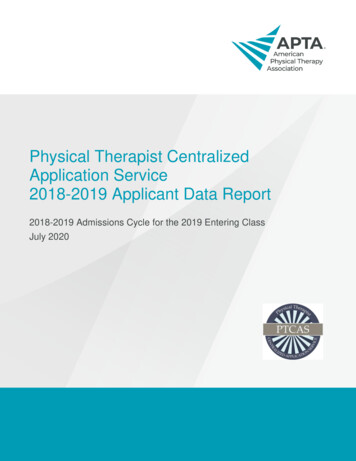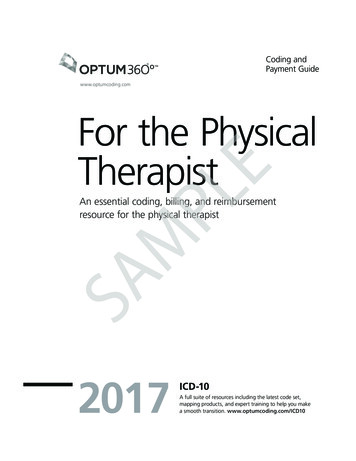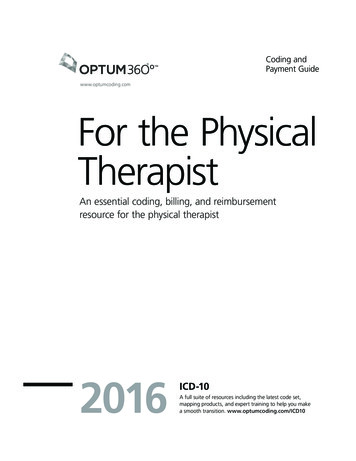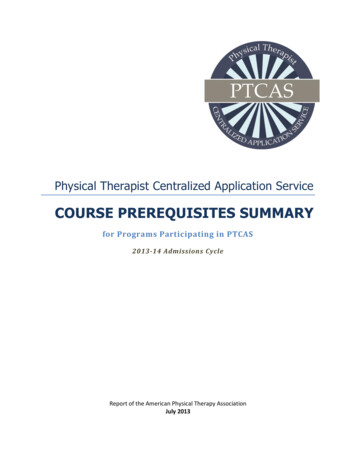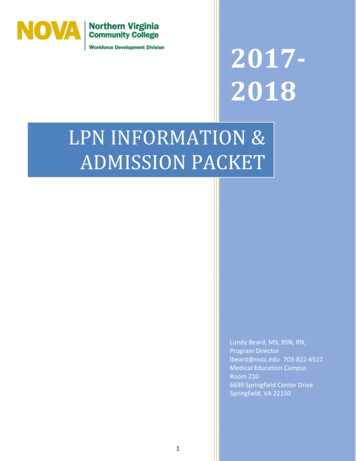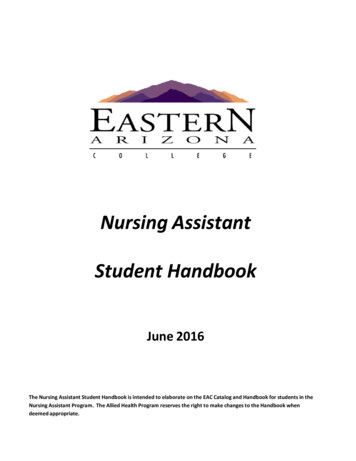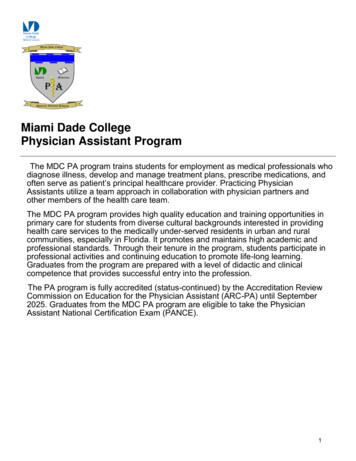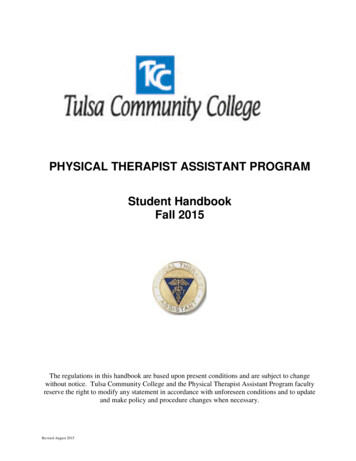
Transcription
PHYSICAL THERAPIST ASSISTANT PROGRAMStudent HandbookFall 2015The regulations in this handbook are based upon present conditions and are subject to changewithout notice. Tulsa Community College and the Physical Therapist Assistant Program facultyreserve the right to modify any statement in accordance with unforeseen conditions and to updateand make policy and procedure changes when necessary.Revised August 2015
TABLE OF CONTENTSSECTION A - GENERAL INFORMATIONIntroductionDefinition and Utilization of the PTAProgram PhilosophyPTA Program Mission Statement, Goals & ObjectivesCompetenciesAccreditation, TCC PoliciesCollege Support Servicespage3456789SECTION B - CURRICULUMCurriculum PatternCourse DescriptionsCourse Enrollment SequenceCourse Credit10111414SECTION C - STUDENTS RIGHTS AND RESPONSIBILITIESLiability InsuranceStudent Health and Physical ConditionGeneric AbilitiesAttendance and TardinessConduct and BehaviorStudent AppearanceSafetyConfidentialityAccess to Clinic / LaboratoryAccess to LockersStudent EmailStudent PerformanceProgress/CounselingWithdrawalProbation/ DismissalStudent 32SECTION D - GRADUATION, LICENSURE AND APTA MEMBERSHIPGraduate follow up32Licensure32Physical Therapy Association Membership33Revised August 2015 2
Informed Consent34INTRODUCTIONThis handbook was developed as a guide to policies and procedures to aid students enrolled inthe Tulsa Community College Physical Therapist Assistant Program. The Physical TherapistAssistant faculty welcomes recommendations for changes from administration, academic andclinical faculty and students. However, the Physical Therapist Assistant faculty members reservethe right to update and make policy and procedural changes when necessary.Melanie Heffington, PTCarla Hinkle, PTA, MSRevised August 2015Vicki Jurries, PTA, MAJeff Hammontree, PT, MS, PCS 3
DEFINITION AND UTILIZATIONOF THE PHYSICAL THERAPIST ASSISTANTDefinitionThe physical therapist assistant is a technically educated health care provider who assists thephysical therapist in the provision of physical therapy. The physical therapist assistant is agraduate of a physical therapist assistant associate degree program accredited by the Commissionon Accreditation in Physical Therapy Education (CAPTE), 1111 N. Fairfax St., Alexandria, VA22314, 703.706.3245, email: accreditation@apta.org, http://www.capteonline.orgThe graduates of this program receive an Associate in Applied Science degree and are eligibleto apply for the licensure examination in Oklahoma or any other state of their choosing. Questionsregarding the licensure examination should be directed to the Oklahoma Board of MedicalLicensure and Supervision at 405.848.6841 orhttp://www.okmedicalboard.org/UtilizationThe physical therapist of record is the person who is directly responsible for the actions of thephysical therapist assistant. The physical therapist assistant may perform physical therapyprocedures and related tasks that have been selected and delegated by the supervising physicaltherapist. Where permitted by law, the physical therapist assistant may also carry out routineoperational functions, including supervision of the physical therapy aide and documentation oftreatment progress. The ability of the physical therapist assistant to perform the selected anddelegated tasks shall be assessed on an ongoing basis by the supervising physical therapist. Thephysical therapist assistant may modify a specific treatment procedure in accordance with changesin patient status within the scope of the established treatment plan.The physical therapist assistant must work under the direction and supervision of the physicaltherapist in all practice settings. When the physical therapist and the physical therapist assistantare not within the same physical setting, the performance of the delegated functions by theRevised August 2015 4
physical therapist assistant must be consistent with safe and legal physical therapy practice andshall be predicated on the following factors: complexity and acuity of the patient's needs;proximity and accessibility to the physical therapist; supervision available in the event ofemergencies or critical events; and type of setting in which the service is provided. When thephysical therapist and the physical therapist assistant are not continuously within the samephysical setting, greater emphasis in directing the physical therapist assistant must be placed uponoral and written reporting.When supervising the physical therapist assistant in any off site setting, the followingrequirements must be observed:1. A qualified physical therapist must be accessible by telecommunications to the physicaltherapist assistant at all times while the physical therapist assistant is treating patients.2. The initial visit must be made by a qualified physical therapist for evaluation of the patient andestablishment of a plan of care.3. There must be regularly scheduled and documented conferences with the physical therapistassistant regarding patients, the frequency of which is determined by the needs of the patient andthe needs of the physical therapist assistant.4. In those situations in which a physical therapist assistant is involved in the care of a patient, asupervisory visit by the physical therapist will be made:a. Upon the physical therapist assistant's request for a reevaluation, when a change intreatment plan of care is needed, prior to any planned discharge, and in response to achange in the patient's medical status.b. At least once a month, or at a higher frequency when established by the physicaltherapist, in accordance with the needs of the patient.c. A supervisory visit should include:1. An on-site re-assessment of the patient.2. On-site review of the plan of care with appropriate revision or termination.3. Assessment and recommendation for utilization of outside resources.PROGRAM PHILOSOPHY AND GOALS.Allied Health Services Division MissionThe TCC Allied Health Services is a learner-centered division synergized through thecollaboration of students, faculty, staff, administration, and stakeholders with a common goal ofpreparing uniquely qualified personnel who will meet the challenges of the complex and everchanging health care delivery system and remain responsive to the communities we serve.Physical Therapist Assistant Program PhilosophyThe Tulsa Community College Physical Therapist Assistant Program is based upon the conceptthat quality education through a balanced variety of learning experiences will enhance anindividual's potential to achieve personal satisfaction and contribute to society. Toward this end,the purpose of this program is to provide the individual desirous of assisting in the practice ofphysical therapy, opportunities to acquire the skills necessary to function successfully as aphysical therapist assistant.Revised August 2015 5
Physical Therapist Assistant Program Mission StatementThe Physical Therapist Assistant Program will produce entry-level practitioners who obtainlicensure as physical therapist assistants, perform safe and ethical interventions under the directionand supervision of a physical therapist, and possess background knowledge and skills which willserve as the foundation for further development of technical expertise and understanding of theoverall health context in which they perform.Goals and ObjectivesThe Physical Therapist Assistant Program curriculum is therefore designed to enable thestudent to:1. Graduate from the program as an entry-level practitioner.Objective: Ninety percent of the physical therapist assistant students have anaggregate score of 95 or above for their clinical performance by the end of Clinical III.2. Pass the national licensure examination and become a licensed physical therapistassistant.Objective: Ninety-five percent of the students completing the Physical TherapistAssistant Program will pass the national licensure examination and 50 percent ofthe students will perform at or exceed the national level.3. Be productive in employment.Objective: Eighty percent of the graduates will be employed as a physical therapistassistant within six months of graduation.4. Work safely, ethically, and effectively as a physical therapist assistant.Objective: Eighty percent of the greater Tulsa area employers of physical therapistassistant graduates of Tulsa Community College will rate their performance assafe, effective and ethically sound.5. Demonstrate lifelong learning skills.Objective: Eighty percent of the greater Tulsa area employers of physical therapistassistant graduates of Tulsa Community College will report that these graduates havecontributed to the advancement of the profession through a participation in continuingeducation programs, teaching research, and serving in/with organizations concernedwith health policy and planning.Revised August 2015 6
CompetenciesUpon completion of the TCC PTA program, having maintained a minimum of a 2.8 GPA foreach semester in the program with all PTA courses, a graduate:1. Performs in a safe manner that minimizes risk to patient, self and others.2. Adheres to legal and ethical standards.3. Produces documentation to support the delivery of physical therapy services.4. Delivers established patient care to reflect respect for and sensitivity to individualdifferences.5. Participates in patient status judgments within the clinical environment based on the plan ofcare established by the physical therapist.6. Obtains accurate information by performing selected data collection consistent with the planof care established by the physical therapist.7. Discusses the need for modifications to the plan of care established by the physicaltherapist.8. Performs physical therapy interventions in a technically competent manner.9. Educates others (patients, family, caregivers, staff, students, other health care providers) usingrelevant and effective teaching methods.10. Participates in activities addressing quality of service delivery.11. Participates in addressing patient needs for services other than physical therapy.12. Manages resources (e.g., time, space and equipment) to achieve goals of the clinical setting.13. Participates in fiscal responsibility in the physical therapy clinical setting.14. Understands the roles and utilization of supportive personnel according to legal and ethicalguidelines.15. Is enabled toward developing a self-directed plan for career development and lifelonglearning.16. Conducts one’s self in a manner in keeping with the list of generic abilities as presented in thePTA Student Handbook to include: Commitment to Learning Responsibility Problem Solving Effective use of Time and Resources Interpersonal Skills Critical Thinking Professionalism Use of Constructive Feedback Communication Skills Stress ManagementRevised August 2015 7
ACCREDITATIONTulsa Community College is accredited by the Oklahoma State Regents for Higher Education(655 Research Parkway, Suite 200, Oklahoma City, OK 73104; 405-225-9100) and the HigherLearning Commission, (www.ncahlc.org or 1-312-263-0456). The College is a member of theAmerican Association of Community Colleges, the North Central Council of Two-Year Collegesand is also approved by the federal government to offer education under the Veterans and SocialSecurity laws.The Physical Therapist Assistant Program at Tulsa Community College is accredited by theCommission on Accreditation in Physical Therapy Education (CAPTE).Department of AccreditationAmerican Physical Therapy Association1111 North Fairfax StreetAlexandria, VA 22314.Telephone: 703-706-3245Email: e program director is responsible for the timely submission of all documentation necessaryfor the accreditation process to include reports of graduation rates, employment rates, the CAPTEAnnual Report, changes in faculty makeup or class size modifications. It is also the responsibilityof the program director to bring all aspects of the program into compliance within 2 years ofnotification of noncompliance by CAPTE and to budget for and generate the necessary paperwork in a timely fashion for payment of all accreditation fees.TULSA COMMUNITY COLLEGE POLICIESAll Physical Therapist Assistant students must comply with the policies and regulations asstated in the Tulsa Community College Catalog and the Student Code of Conduct.Revised August 2015 8
COLLEGE SUPPORT SERVICESStudent ServicesTulsa Community College offers a wide range of student services from Academic Advisement,Health and Fitness Centers, Student IDs and parking and much more.Please use the following hyperlinks to refer to the relevant web pages. Academic Advisement Bookstores and Textbooks Career Services Call2000 – Student Services and IT Support Contact Information Costs and Payments Disability Resources Enrollment Services Financial Aid Campus Police Fitness Center Graduation International Language Center and Language Laboratory International Student Services Library Recovery Support Student Activities Student Code of Conduct Student Consumer Information Student Health Services Student IDs / Parking Student Records Testing Center Services TRiO Programs Veterans and MilitaryRevised August 2015 9
PTA CURRICULUM PATTERN1st Fall Semester8 PTA credit hours / 18 hours totalBIOL 1314 Anatomy & PhysiologyPHTA 1203 Anatomy & Physiology for PTA'sPHTA 1303 Introduction to Physical TherapyPHTA 1211 Clinical OrientationPHTA 1242 Human Growth & DevelopmentALDH 1323 Medical TerminologyENGL 1113 English Composition I3 hr lec/ 3 hr lab2 hr lec / 3 hr lab2 hr lec / 3 hr lab1 hr lec2 hr lec3 hr lec3 hr lec1st Spring Semester10 PTA credit hours / 16 hours totalPHTA 1392 Clinical Procedures IPHTA 1363 Kinesiology for PTAsPHTA 1383 Pathophysiology for PTAsPHTA 1231 Clinical Practice IENGL 1213 English Composition IIPSYC 1113 Intro to Psychology1 hr lec / 3 hr lab3 hr lec3 hr lec80 hours in 2 weeks3 hr lec3 hr lec2nd Fall Semester13 PTA credit hours / 16 hoursPHTA 2442 Psychosocial Aspects of Physical TherapyPHTA 2343 Clinical Procedures IIPHTA 2373 Therapeutic Exercise IPHTA 2543 NeurosciencePHTA 2432 Clinical Practice IIPOLS 1113 American Government2 hr lec/ 40 hr lab2 hr lec / 3 hr lab2 hr lec / 3 hr lab3 hr lec80 hours in 2 weeks3 hr lec2nd Spring Semester9 PTA credit hours / 12 hours totalPHTA 2383 Therapeutic Exercise IIPHTA 2113 RehabilitationPHTA 2551 Pharmacology for PTA'sPHTA 2522 Special Studies in Clinical PracticeHIST 1483 American History (or HIS 1493)2 hr lec / 3 hr lab2 hr lec/ 3 hr lab1 hr lec1 hr lec / 2 hr lab3 hr lec2nd Summer SemesterPHTA 2486 Clinical Practice III480 hours in 12 weeks6 PTA credit hoursGeneral Education Requirements: 22 credit hoursSpecialized Course Requirements: 46 credit hoursTotal Credit Hours:68Revised August 2015 10
COURSE DESCRIPTIONSPHTA 1203 - Anatomy and Physiology for PTAs3 credit hoursA supplementary study of the human body’s structure and function as these relate to the practiceof physical therapy. Emphasis will be placed on musculoskeletal, circulatory, and nervoussystems. Prerequisite: Admission to the PTA program. Includes lab component.PHTA 1211 – Clinical Orientation1 credit hourThis course is an orientation to the physical therapy clinic environment. The course covers theprofessional clinical expectations, procedures of processing patients, treatment preparation,introduction to medical documentation, and activities associated with preparing students for futureclinical experiences. Prerequisite: Completion of all Allied Health Risk requirements.PHTA 1231 - Clinical Practice I1 credit hourA supervised clinical experience; two concurrent weeks of full time clinical education exposureincluding observations and applications of physical therapy services. Prerequisites: All previousPTA coursework with a “C” or better, or instructor approval.PHTA 1242 - Human Growth and Development2 credit hoursStudy and application of current theories regarding human growth in social, cognitive, behavioraland motoric domains as related to the practice of physical therapy. Requires admission to the PTAprogram.PHTA 1303 - Introduction to Physical Therapy3 credit hoursHistory, philosophy, ethics, settings, and trends in physical therapy. Delineation of roles of thehealth care team, and of physical therapy personnel, with interpersonal skills needed to function asa health care provider and team member. Principles and procedures of basic patient care skills anddocumentation. Requires admission to the PTA Program. Includes lab component.PHTA 1363 - Kinesiology for PTAs3 credit hoursA study of anatomical structures and movement as related to physical therapy procedures. Thebasic principles of the relationship between joint motion and mechanical action. Application ofprinciples with emphasis on the analysis and bio-mechanics of all human motion. For PTAstudents. Prerequisites: All previous PTA coursework with a grade of “C” or better or instructorapproval. Includes lab component.PHTA 1383 - Pathophysiology for PTAs3 credit hoursA study of selected disease and injuries as they relate to clinical conditions seen in the practice ofphysical therapy. Prerequisite: All previous PTA coursework with a “C” or better or instructorapproval.PHTA 1392 - Clinical Procedures IRevised August 20152 credit hours 11
Principles and techniques of basic physical therapy interventions, with emphasis on physiologicalchanges and effects in commonly seen diagnosis and in response to treatment. Laboratory practicewith emphasis on positioning and manual skills.PHTA 2113 – Rehabilitation3 credit hoursA study of principles of functional training as they apply to a variety of diagnoses seen in PhysicalTherapy. Theory and therapeutic techniques involving gait, functional mobility, assistive devices,and the progression of rehabilitation. Prerequisites: All previous PTA coursework with a grade of“C” or instructor approval. Includes lab component.PHTA 2343 - Clinical Procedures II3 credit hoursTheory, physiology, and application of heat, cold, light, water, electricity, and mechanicalcompression/distraction in therapeutic treatment of tissues. Overview of medical physics.Prerequisites: All previous PTA coursework with a grade of “C” or better or instructor approval.PHTA 2373 - Therapeutic Exercise I3 credit hoursGeneral and specific exercises for conditions commonly referred to physical therapy. Principlesinvolved in the theory and practical applications of specific therapeutic exercise and mechanicalappliances. Prerequisites: All previous PTA coursework with a grade of “C” or better or instructorapproval.PHTA 2383 - Therapeutic Exercise II3 credit hoursContinuation of Therapeutic Exercise I and additional theory and application of exercisetechniques, with emphasis on treatment of long-term disabilities. Prerequisites: All previous PTAcourse work with a grade of “C” or better or instructor approval. Includes a lab component.PHTA 2432 - Clinical Practice II2 credit hours(catalog incorrectly labels course Clinical Practice III)A supervised clinical experience; two concurrent weeks of full time clinical education exposureincluding observations and applications of physical therapy services. In addition, a weekly groupdiscussion of selected topics, in a colloquium format. Prerequisite: All previous PTA courseworkwith a grade of “C” or better or instructor approval.PHTA 2442 - Psychosocial Aspects in Physical Therapy3 credit hoursA survey course explaining the psychological and sociologic effects of disabilities, including theimpact of culture and economics with regard to the patient, family, and society. The student willalso participate in 8 hours of community service used to promote awareness of socialresponsibility, citizenship and advocacy.Revised August 2015 12
PHTA 2486 - Clinical Practice III6 credit hoursSupervised application of physical therapy procedur
Upon completion of the TCC PTA program, having maintained a minimum of a 2.8 GPA for each semester in the program with all PTA courses, a graduate: 1. Performs in a safe manner that minimizes risk to patient, self and
